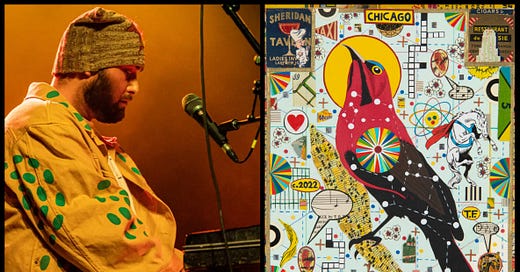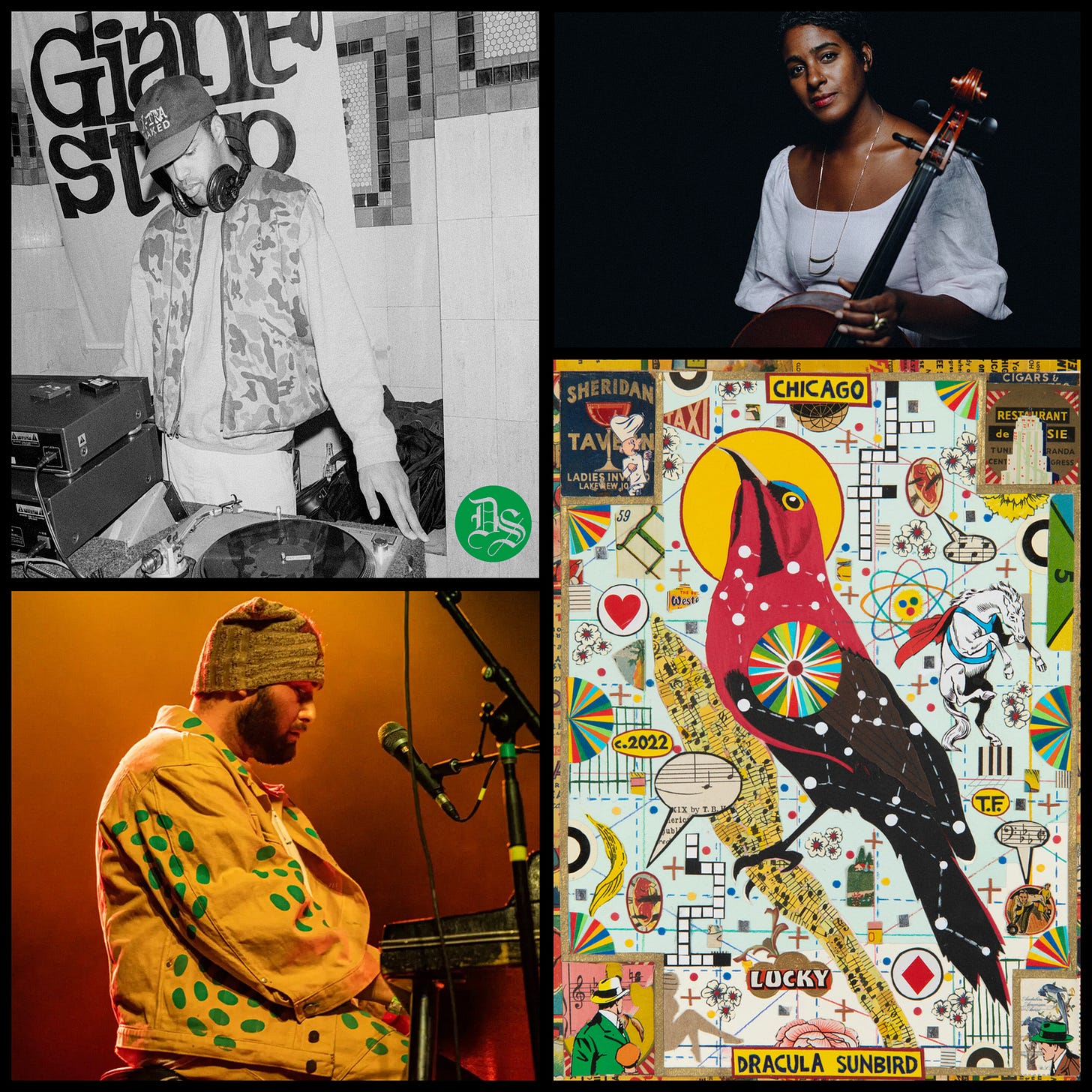Bklyn Sounds: 2/28/2023 - 3/6/2023 + Sounds of Saving
Interview with Nick Greto of Sounds of Saving + Shows: "Giant Step Retrospective 1990-95" / Leyla McCalla / "Outsider Art Fair" / Roy Ayers + Yaya Bey + Dreamcastmoe / Conclave Rhythm Section / more
Right about now, the necessity for an organization like Sounds of Saving should seem pretty self-evident: Is it even a question that under the cloud of the 2023 pandemicine, we need people working in the service of musical assistance, healing mental health trauma, and preventing self-harm? For some, communal musicking’s contribution to deep-rooted joy, how it provides a healing ray of sunshine through the stagnating fog, has long been obvious. It is certainly not an exaggeration to claim that music has been instrumental in saving me from greater harm in my own life. And that, in the pulse of the contemporary world, I can’t possibly be one of the only ones.
I know I’m not — if only because other testimonials to music’s power of catching those in emotional freefall are seeded throughout the Sounds of Saving (SoS) website. Elevating the mental-health-precarity stories of artists and listeners is among the central tenets of the Brooklyn-based 501c3 founded by digital advertising executive Nick Greto, and psychotherapist/music photographer Charlie Gross. I first learned about SoS a couple of years ago after following Charlie’s work on Instagram, and discovering that its “board” not only includes all sorts of local musickers I admire, but dear friends whose lives were affected by depression and self-harm. I’ve been looking for an occasion to bring SoS’s mission (“We see music as a uniquely powerful space to process struggle and joy to stay connected to each other”) to light, as it dovetails with Dada Strains. And was happy when one came along.
On Wednesday night (March 1st), Sounds of Saving is staging a pair of shows at public records in the Gowanus, part of that club’s OffAir series. The bill features two amazing local singers/songwriters/forces of nature, Meshell Ndegeocello and Nick Hakim, as well as DJ sets by Rahill. Ahead of the evening, I asked SoS co-founder Nick Greto about some of the ideas behind SoS, about experiences in using music to connect to mental health struggles, about some past and ongoing SoS initiatives, and what is in store. (In-between the questions, I’ve embedded a few of my favorite performances from SoS’s “Songs That Found Me at the Right Time” video series, which Nick explains below).
What are the experiences that led you to start Sounds of Saving?
SoS was founded in response to a major loss in my life. When my uncle Mike took his own life and left behind his wife and four children it had me take a long look at the world around me. I had also lost a couple of friends to addiction and I decided I wanted to make an impact.
I grew up in the suburbs of Philadelphia and therapy was not a part of the conversation. But I like to think that people like Meshell Ndegeocello and Nick Hakim - meaning all of the artists I loved and the fellow fans I connected with - helped fill that void.
In our mission we of course acknowledge that music per se is often not sufficient as mental health care. But we believe music, being a focal point of emotion and a basis of connection between people, is an entry point to these conversations and can be used to help direct people to awareness, education and care.
What kind of artists and musicking folks get involved with SOS? Is everyone involved a “survivor” of friends/relatives attempting self-harm or committing suicide?
While suicide prevention is a big part of what we do, especially with our 988 Lifeline video partnership, this is not the sole focus of our mission. We address the full spectrum of mental health problems and interventions and ideally want to promote and support a path to acknowledging struggles and getting support before getting to a point of crisis where life hangs in the balance.
We pride ourselves on collaborating with artists that span the infinite continuum of musical styles and all with unique histories of experiences with mental health. We are adamant that we don’t have an agenda that we try to find artists to deliver PSA style endorsements of. Instead, we are interested in candid storytelling and authentic personal narratives, and we feel this is what really inspires others and leads to connection. We also believe in the power of musical subcultures, so we are interested in working with artists at all levels of industry. Artists are already so vulnerable by the nature of what they do and each person has their own unique struggles—like, Okay Kaya is singing about anxiety and self-consciousness, or Ab-Soul is rapping about loss, grief, and suicide. We work with artists across all genres to uplift these individual stories knowing that someone out there with similar struggles might see our videos or content and feel seen. And to know that no situation is hopeless, that there's always a pathway to help. We have also found that artists often find themselves in the position of being de facto mental health support for their fans. We hope our project gives them an opportunity to create something that can serve this purpose. In our interview with Sharon Van Etten she shared a lot about her experience of this with her fanbase.
Most people are familiar with the idea of copycat suicide, but not so much with the opposite phenomenon known as the Papageno effect. The Papageno effect refers to the idea that when mass media shows non-suicide alternatives to crises—ie, an artist talking about how they persevered through depression or suicidal thoughts—viewers who are struggling feel inspired to persevere as well. Papageno is our guiding principle, and its roots in de-stigmatization apply to any sort of mental health struggle.
Because artists are naturally so open about these things, many have told us that fans will approach them and unload their struggles. The artists want to help, but they don't know how or it's not their place—and that's where we come in. We bridge that gap to help fans in need find and navigate support.
What kind of programs and outreach situations has SOS already been involved with? How do you interact with the mental health community and the music community?
Last summer we went on tour with Here and There, a 14-stop touring festival curated by Courtney Barnett, to bring resources and pathways to mental healthcare directly to fans. That tour was unique in that it popped up in smaller markets across the country, where mental health resources and education are already scarce. Traditional mental health messaging, like jargon and self-help mantras, can be really repellent to people who need support. We try to be the antithesis to that. On the Here and There tour, for example, we set up a booth at every stop that had a local mental health professional and a volunteer member from 988 who were there to help fans navigate local resources. But we also had fun, dynamic ways for people to engage—like our "Songs That Found Me" cards, where people shared three songs that found them at the right time on one side of the card, and their mental health stories on the other.
I recall meeting a person in Chicago that was in distress and was beyond grateful we were there. He was in tears when I met him. He said the night before was the worst night of his life. But he said he had been calmed a bit by our discussion and by the music at the event. I offered him our resource card to connect with some local clinicians and other support. He left not at 100% but he was smiling and reassured me he was okay. He was grateful for the music and our chat. We also set up these booths at local NYC shows, and have more plans for 2023 tours in the works.
We're probably most known for our Songs That Found Me At The Right Time video series in partnership with 988. These are an evergreen kind of outreach where the Papageno effect really shines. We ask musicians to cover a song that found them at the right time, and interview them about their mental health journeys and what the song means to them in particular.
Wednesday’s show at public records with Meshell Ndegeocello, Nick Hakim and Rahill is in support of the Sounds Of Savings’ Therapy Grant Fund. What sort of situations do you expect to use the Therapy Fund for?
Our SoS Therapy Fund provides fans of select artists with vouchers for up to 12 therapy sessions with local, culturally-competent clinicians. We are trying to wrap the activation of these funds into video releases or events. We started a fund for fans of Indigo Sparke, and our board member Meshell Ndegeociello helped us launch one through Robert Glasper’s Blue Note residency which was to honor and be a tribute to his friend Meghan Stabile, who was a beloved part of the NYC music world.
So, after this show at public records, do you have other upcoming live music events, or recording ideas that directly engage listeners and fans?
We're always doing interviews and mental health check-ins with artists on our Instagram, sharing stories. We really are building a community. And we have so many videos, and events in the works right now, but nothing we're allowed to tell you about yet! You'll just have to follow us on Instagram and stay tuned.... But I will say that our Youth Advisory Council leader Alyssa Goldberg recently organized a show with local bands at Rockwood Music Hall, the first in a long series to come. Keep your eyes peeled for the next one very soon!
Any other Sounds of Savings initiatives or upcomings you want to shout-out?
We recently became Republic Records's dedicated mental health partner as part of their 2023 mental health initiative. We've also been actively expanding our Youth Advisory Council—so if you're between the ages of 18-25; love music and mental health; want to talk to artists, photograph shows, and curate events close to your heart, hit us up!
(Meshell Ndgeocello + Nick Hakim + Rahill, Wed. 3/1, 7p & 10p @ public records 233 Butler St. Gowanus - $10.30)
THIS WEEK’S SHOWS:
Keep reading with a 7-day free trial
Subscribe to Dada Strain to keep reading this post and get 7 days of free access to the full post archives.



